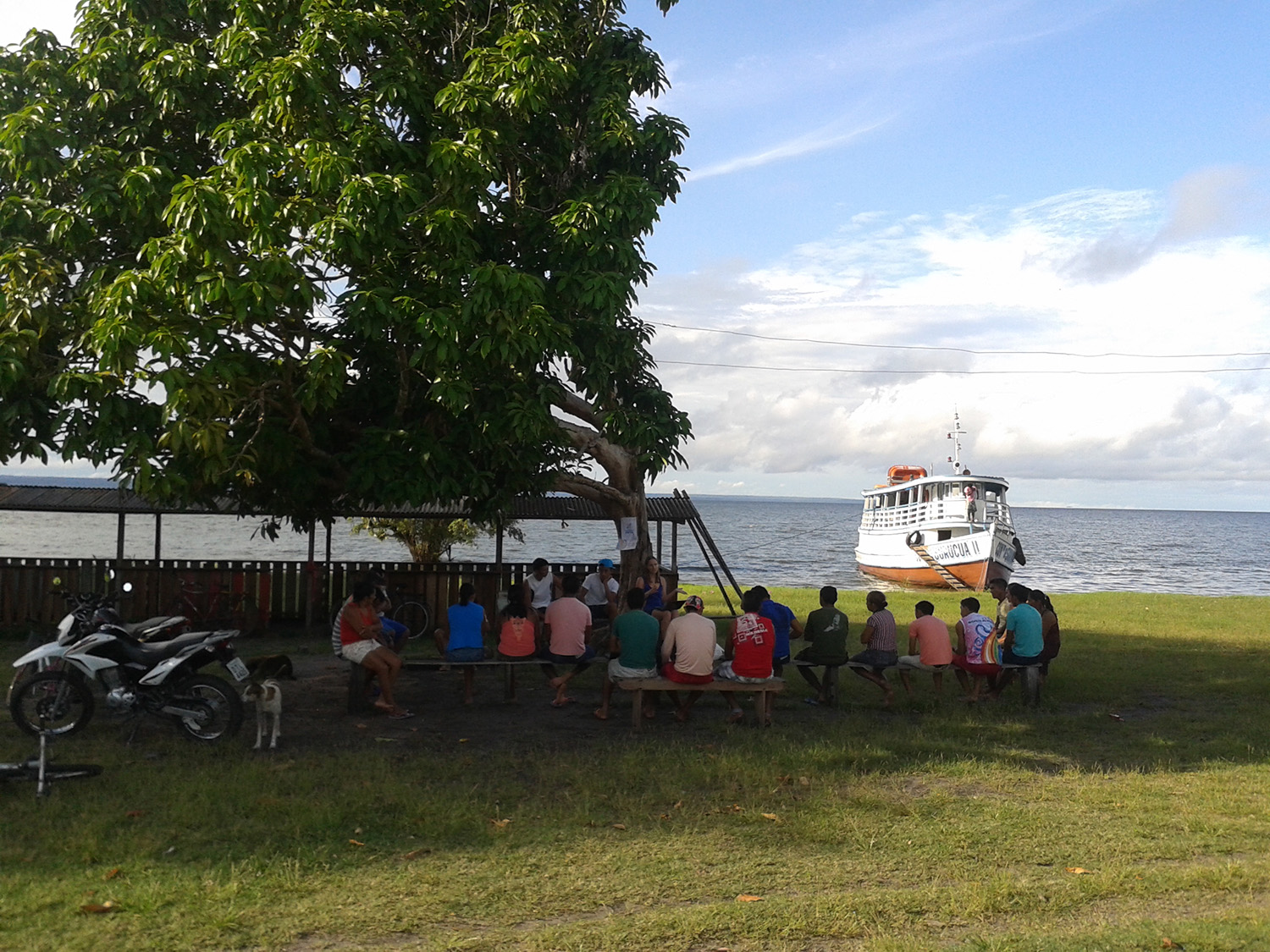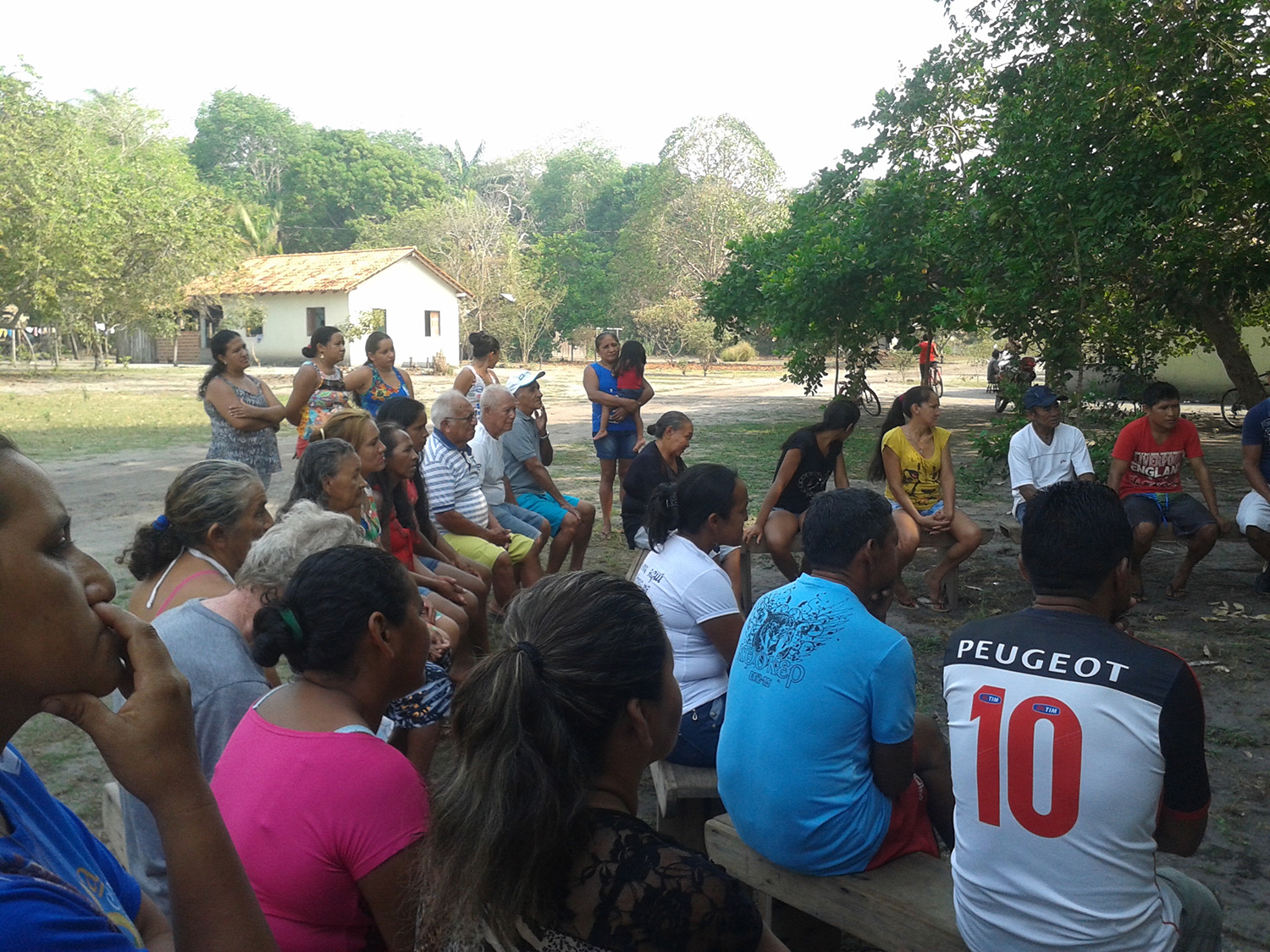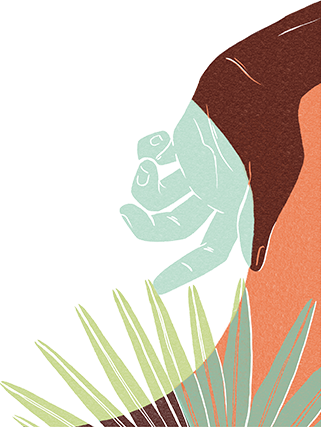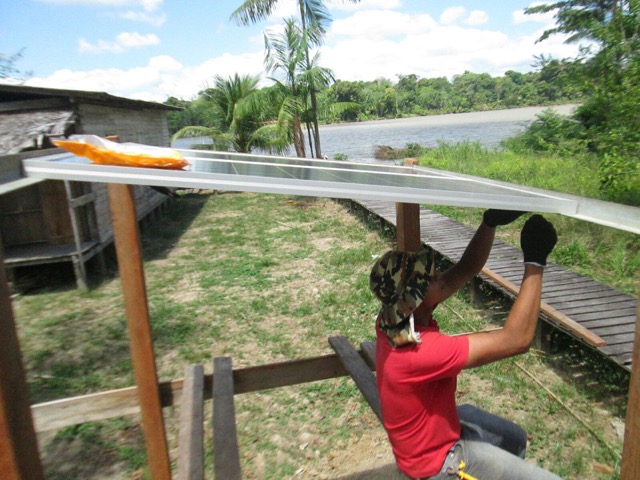 23.06.2016
23.06.2016
A transformational partnership: CASA and CAIXA Funds
During the last weeks, the CASA Socio-Environmental Fund website published ten very special stories, presenting people, communities, and initiatives of great importance and impact, crowning ten years of work of this institution.
Concluding this special celebration, we are honored and elated to present here the great partnership between the CASA Fund and the CAIXA Socioenvironmental Fund – an encounter between partners that acknowledge each other and are aware of the large potential of their actions.
The 2015 joint call for projects was an important step in recognizing our work and expanding the serious and committed work developed by our CASA Fund’s passionate team. We believe in our work and rejoice in watching hundreds of communities transformed by successful initiatives across South America.
Executive Director Cristina Orphêo talks about the importance of this partnership: “There was great synergy between the two Funds and a deep experience in our joint action. Through this partnership, we were able to support 100 projects, each with a R$ 30,000 grant, totaling R$ 3 million in grants; in addition, we provided capacity building workshops for grantees. Thus, we managed to expand the alternatives for communities to seek their sustainability and strengthen their local protagonism.”
Efficient and innovative strategy
Jean Rodrigues Benevides, directly responsible for this partnership, is the Caixa Econômica Federal (Federal Savings Bank) National Sustainability and Socioenvironmental Accountability Manager. He explains what has led to this confluence: “The objectives and the way CASA operates attracted our interest because of its proposal to support small projects of great impact. The structure of the CAIXA Socioenvironmental Fund is very large and, thus, our operating costs are high. That’s why we were interested in formalizing a partnership with the CASA Fund. There was a convergence of interests and the perspective of reducing operating costs to expand our action within the guidelines of our institution.”
The partnership is just beginning. Reports of the first projects have yet to be concluded, but Jean shows his appreciation of the scope of the calls for projects: “Even before knowing the results in detail, we can see the great diversity and the wealth of themes included in the call for projects, with a huge capillarity, reaching out to groups and communities throughout the country. These projects reproduce in a very concrete way the motto “think global, act local.” There are projects focusing on climate change, poverty reduction, income generation, creation of social technologies, sustainable consumption, and citizens’ action networks.
“The most innovative aspect of the CASA Fund is its strategy and model used to publicize the call for projects, which is broad and involves extensive participation. The network of partner institutions allows the call for projects to reach an audience of communities and organizations that otherwise would never see a public call for projects. There is a synergy,” added Jean.
The sun is free for all
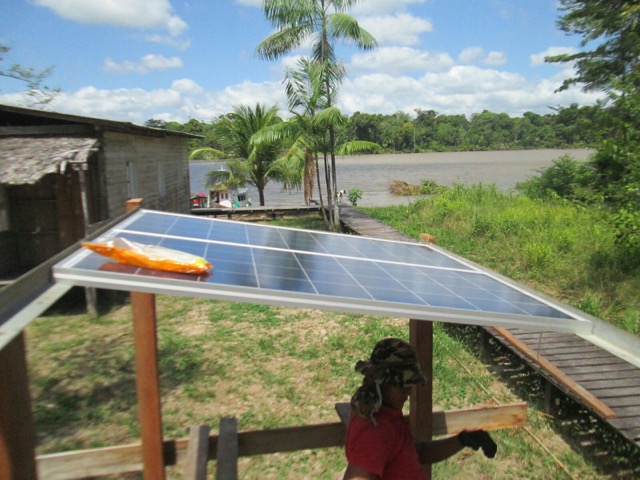
Solar panels in the Gurupá community at the mouth of the Amazon River. Project supported by the CAIXA Fund and CASA Fund partnership. (Photo: Archive CASA Fund)
One of the highlights in this first call for projects is the generation of solar energy, showing that it is possible to tread new pathways in this delicate issue of energy matrices.
Electrical engineer Joilson José Costa is one of the main leaders of the National Campaign for a New Energy Policy. He explained that the “Campaign arose from the Climate Change and Social Justice Forum, and aims to promote a new policy for the energy sector in Brazil that takes into account the challenges posed by the 21st century. It is based on the principles of economic efficiency, social justice, respect for cultural diversity, democratic participation, and environmental sustainability. This is the objective of the “Energy for Life” project that promotes and gives visibility to photovoltaic solar energy and was approved in this joint call for projects of the CAIXA and CASA Funds.
“We are organizing workshops to explain in the simplest and most popular way what is photovoltaic energy, its potential, and ways to use it,” said Joilson. “We are gathering a very broad audience, such as local communities where the meetings take place, engineering and architecture students to answer their doubts, and to explain the benefits of photovoltaic energy produced by solar panels at private residences and companies. We want to show that nowadays the technology is very simple, viable, and could be facilitated by special credit lines.
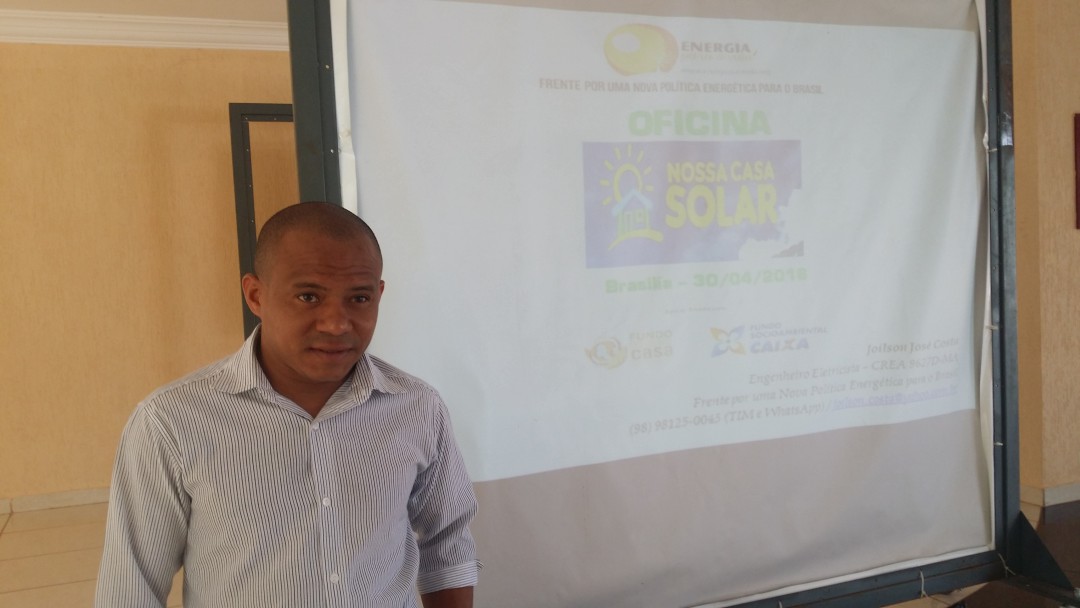
Joilson Costa in one of the presentations made by the project Nossa CASA Solar (Our Solar Home). (Photo: Archive CASA Fund).
“Today there are no federal government incentives, and that’s why we are trying to reach out to state and municipal governments, putting forward emblematic cases, such as a housing development in Juazeiro, Bahia(*) state, where in addition to generating their own energy, the families are also making an extra income. We don’t need further expansion of hydroelectric power plants that violate community and environmental rights; we don’t need the conflicts arising from aeolic energy, nor burn fuels at thermoelectric power plants. The sun is here, it’s free and for all.”
(*) Energy and Income Generation Project implemented in residences in Praia do Rodeadouro and Morada do Salitre in Juazeiro, Bahia State, both part of the program My House My Life, supported with funds from FSA CAIXA.
Illuminating life and conscience
This same awareness mobilized the Surucuá community, in the Tapajós Arapiuns Extractivist Reserve on the Middle Tapajós River, to create a power generating project through a photovoltaic miniplant to process native fruits and cassava flour. These products ensure income for the community.
The project was presented by the Surucuá Agroextractivist Residents and Producers Community Association (AMPROSURT). Project coordinator Ângelo Ricardo Souza Chaves was born in a family that has always lived in the Surucuá community and is proud of descending from Indigenous peoples. He says he’s got Indigenous blood and habits. Born and raised in the community, he only left at 17 to study in Manaus. He moved to take a technical course in agriculture and animal husbandry, but ended up staying in the capital. He graduated from the Environmental Engineering Faculty, married, but decided to return home. The desire to help his community with his accumulated experience was a childhood dream.
“It’s a big challenge, said Ângelo. Despite the beauty of the place, there are many social problems, there is a lack of structure, and corruption is rampant. It’s very difficult to deal with this reality, but we need to find solutions for the community. The Association already existed when I returned, but it was disorganized. When we heard about the CASA Fund call for projects, we brought the community together and decided to submit a proposal.
“Based on this movement, the community got together to broadly discuss the issues involving the Extractivist Reserve. Several partnerships were initiated, the Association was strengthened as an institution, and the creation of a cooperative was proposed to supply products to the government.
The natural dynamics of rivers and populations
“In the beginning, many people did not believe [it would work out],” continued Ângelo. “They said they had gone through this before, they had tried other projects, but they had never worked. However, with just a few actions, we achieved some progress. Cassava flour, the community’s main product, has more value now. We are improving process hygiene and flour quality, creating a reference for this organic product.”
In addition to all the problems inside the Reserve, there is a larger issue that worries us at this moment. The communities will be directly affected by the Tapajós River dam for the main planned hydroelectric power plant.
“The main food of the riverbank communities is the fish they catch and the whole ecosystem will be affected by the dam constructions. People are still under the illusion of having electricity or employment. This is the fantasy peddled to those populations who want the right to energy, but are unable to assess the impacts, and don’t know there are alternatives. The photovoltaic miniplant project is an example of a viable alternative, possible and without impact… Outside people see forest and rivers through their economic potential. With this view, they believe they have to occupy those spaces and take advantage of this potential. In fact, this region is already occupied, it has a population that uses those resources and realizes their importance. There is a natural dynamics of rivers and populations; for centuries, capitalism, in its ignorance, has disrespected it.”
We have been here for a long time
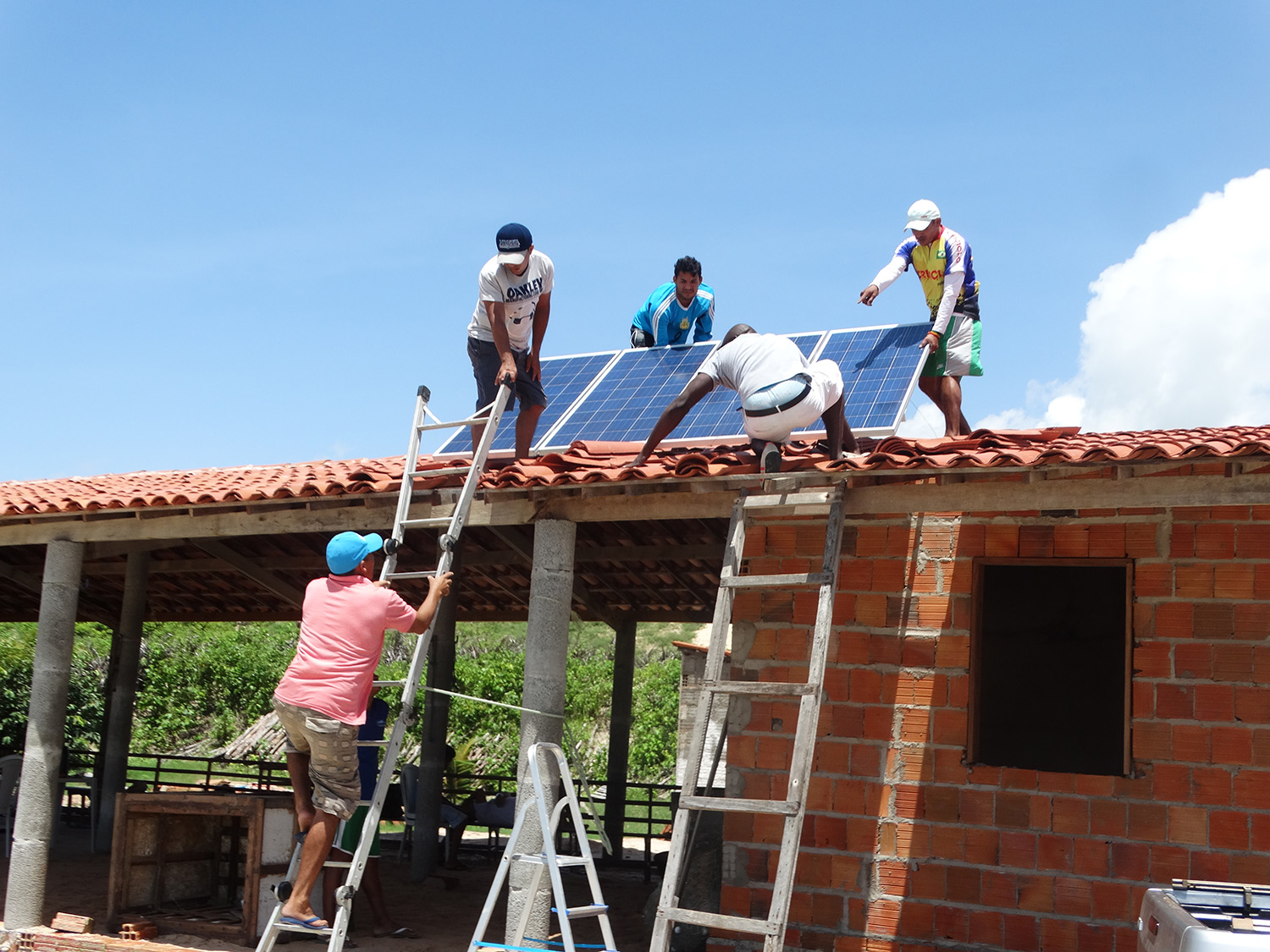
Photovoltaic system installation at the Maceio Settlement in Itapipoca Ceará. Project carried out with support from the CAIXA Fund and CASA Fund.
Another project accepted in this call for projects also involved the generation of photovoltaic energy in a community facing a different reality, albeit no less complex. The project was presented by the Maceió Algae Producers Association (ACALMA) located in the Maceió Settlement (Baleia District) in Itapipoca, Ceará state. Seu Chico, as Francisco Gaspar dos Anjos is known, is the secretary of the Association founded in 2011. He talks about his community: “We live in the Maceió Settlement, with eleven communities and a population of 6,000 people. However, for the last nine years we have maintained a resistance campsite on the beach, to defend this territory against a large real estate development. We have been here for a long time, and we have our traditional way of occupying the land; we are farmers and fishers. That’s why the Association is an important instrument in the struggle to show we have a project for this beach area that ensures people free access to the sea. We appreciate our culture, collective work, the presence of youth. We organize courses, gatherings, research, and exchanges to further consolidate our organization.
“Here, in addition to farming and fishing, we cultivate algae in the coastal sea. We collect the algae without damaging the environment or their reproduction; then, they are placed on PVC-pipe floaters to grow until they are ready to be harvested and processed. With the harvested seaweed we make products such as mousse, cocalga (a sweet seaweed bar), and dried ground algae. That’s why this CASA-funded project is so important. The electricity brought to our camp will consolidate our struggle.
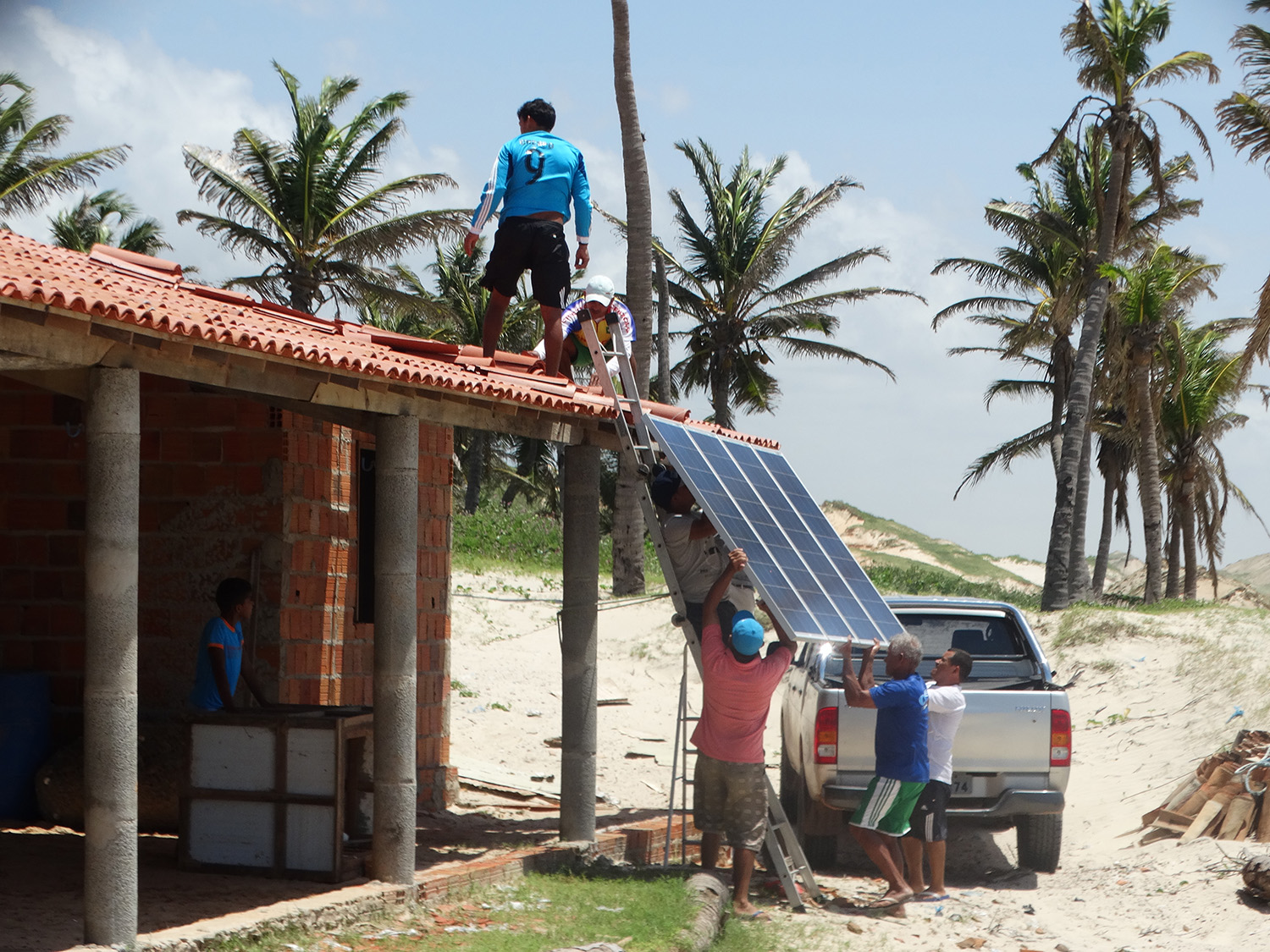
Photovoltaic system installation at the Maceio Settlement in Itapipoca Ceará. Project carried out with support from the CAIXA Fund and CASA Fund.
“We have deep affection for each person or entity that comes along to share and appreciate our culture, the traditional way of life of native people. Many people do not understand our ideal; they think we are backward, against development. We have a dream of reaching an income level that would ensure the subsistence of young people in the community, so they are not forced to move out. With our strength and perseverance we’ll get there…”
Reaching out everywhere
In addition to many energy-related projects, Jean Rodrigues from the CAIXA Fund highlights other important initiatives: “I’m really impressed to see how far we got, the impact of the grants provided – which do not amount to much. We have urban action projects, tourism in Rocinha, recyclable waste pickers, Indigenous women producing arts and crafts – all very important and diverse issues. Among the target audience, we can identify women, young people, Indigenous people, and networks of productive chains. This adds dimension and scope to the call for projects, focusing its purpose of being aligned to public policies, such as the water policy in this time of water shortages.”
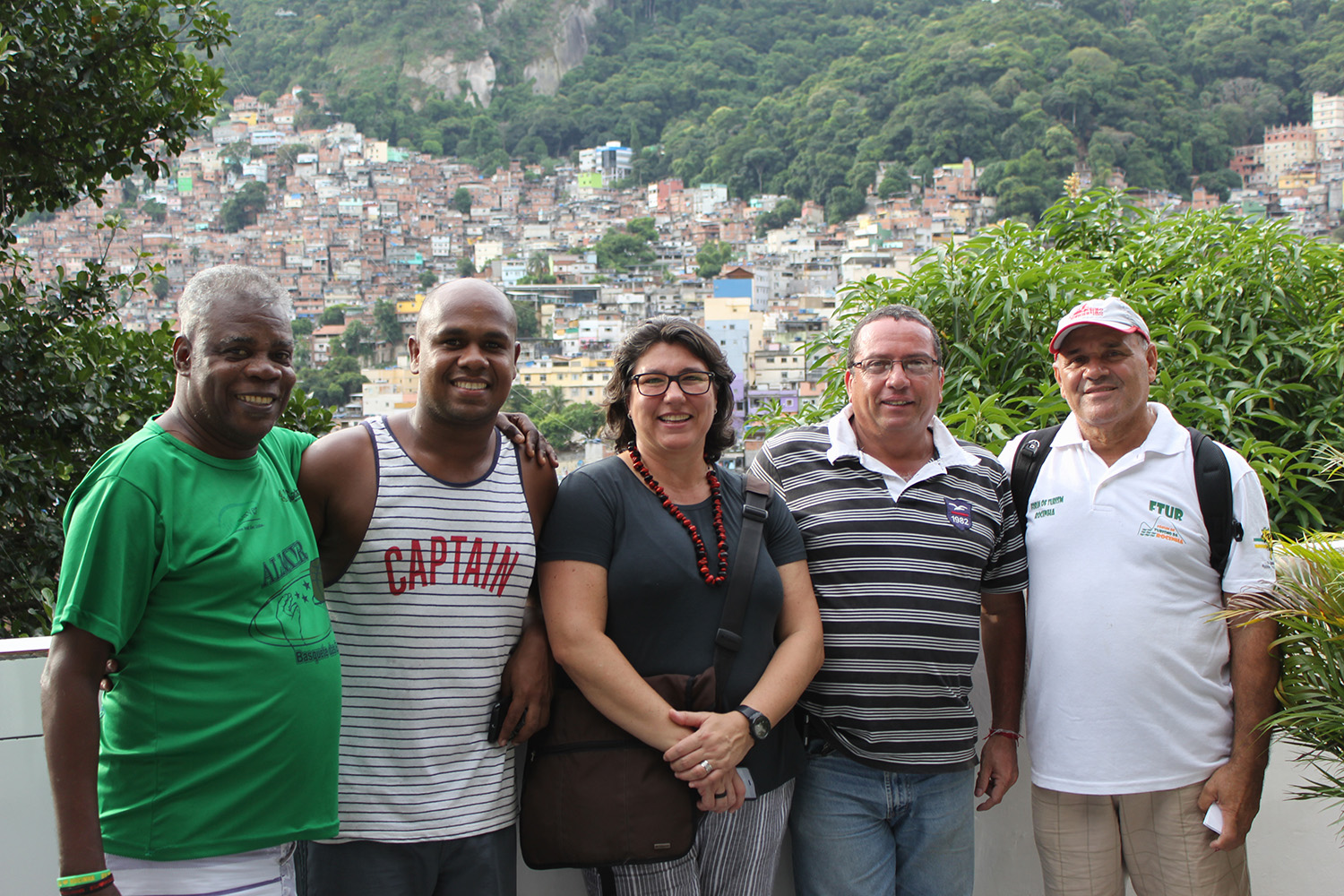
The Project Assistant Claudia Gibele, responsible for monitoring the projects of the partnership CAIXA Fund – CASA Fund, visiting the project along with representatives of the Rocinha Center for Tourism and Environment.
This issue of water is present in some emblematic projects, such as “Collecting water, sowing life” of the Boa Esperança Agroecological Farmers’ Cooperative (COOAABE). This temporary settlement was created eight years ago in the João Ramalho municipality, a conflict-ridden region in northwestern São Paulo state known as the Pontal do Paranapanema. There are many problems in this settlement: a general lack of structure for people living there; the land was divided up in lots but there is no common land for cultivation, no technical support is available; there are alcoholism issues and political conflicts – all this aggravated by water shortages that block any cultivation in many of the lots.
Presented by the cooperative, the project has already concluded the construction of the three planned water tanks, using the technique of iron reinforced cement, to collect rainwater making possible cultivation on lots selected by the Association for this project.
Curing the land
Dona Diva and Sebastião Mendes de Oliveira (better known as Tião) are married and have raised a beautiful family. They live and work together in the settlement. In addition, they have also created the Association that submitted this project in partnership with the Popular Cooperatives Incubator, linked to the São Paulo State University (UNESP) in Assis.
“It took a lot of struggling to get a piece of land, said Tião. And to organize the people and improve our life we created the Boa Esperança Agroecological Farmers’ Cooperative (COOAABE). This settlement has been going for eight years, and now, with the Cooperative and the projects, life has changed a lot. It’s much, much better.
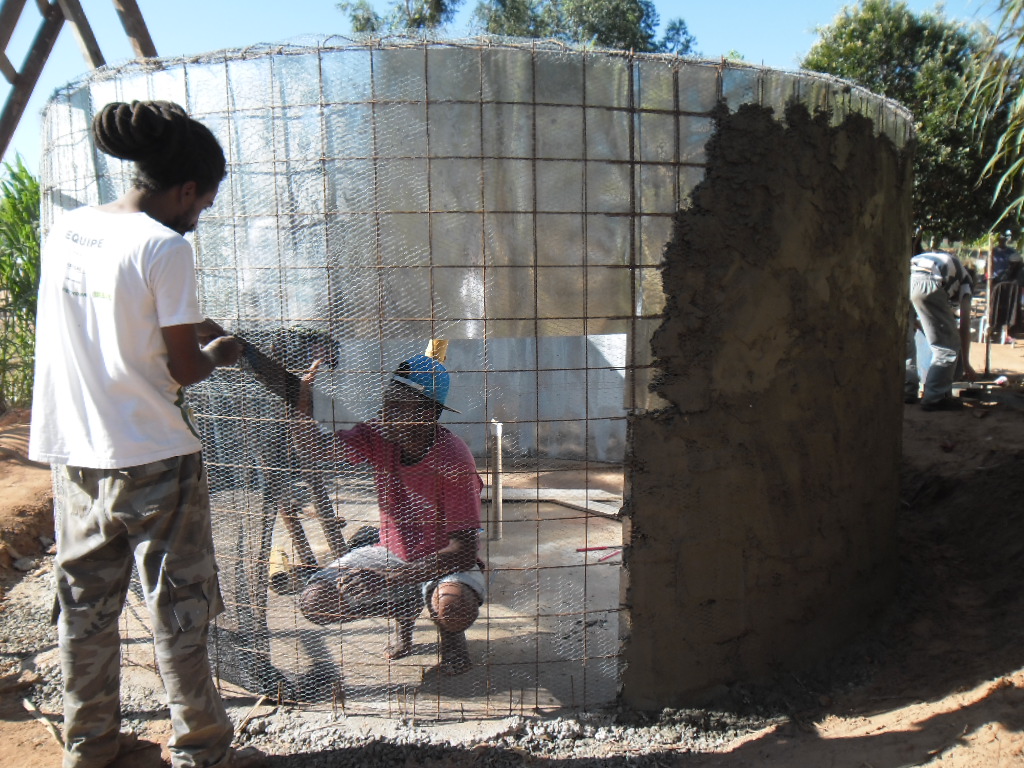
The community participating in the construction of the cisterns. The expectation is that the technique will be replicated. (Photo: Archive CASA Fund).
“Here I have a peaceful life with my family. I’m my own boss. I see the results of my work. We have our plot, we are increasing production, and are moving into agroecology. When we got here there was nothing; it was a wasteland. We are recovering it. Now, it’s full of trees, it’s got lots of fruits…soon we’ll have our own seeds, seedlings…
“It’s not easy to get the people together this way to live in the settlement. Gosh! People are not used to live together, work together, and think about their work. Most always they had a boss; they are used to obey orders. So, it takes time for them to understand, to learn…but we’ve got to be patient,” said Tião.
Dona Diva’s family also came from the countryside. She said that her father helped to deforest Paraná state. He was not aware of what he was doing. But now they all understand the damages to the land and the importance of new actions.
“We suffered a lot working as employees all our lives. We could barely afford to shop for food. Nothing was left, not even to buy flip-flops. Now I’m happy. Gosh! I’ve never worked so much in my life, but the fruits of our work are now ours. The rainwater tank project arrived at the right time, when the flame was going out. Then, we all got to together to work collectively, with a party and lots of food for everybody. Even people who didn’t work came for the food… but it didn’t matter to us. ‘Go and eat,’ I used to say, so they got closer to us.
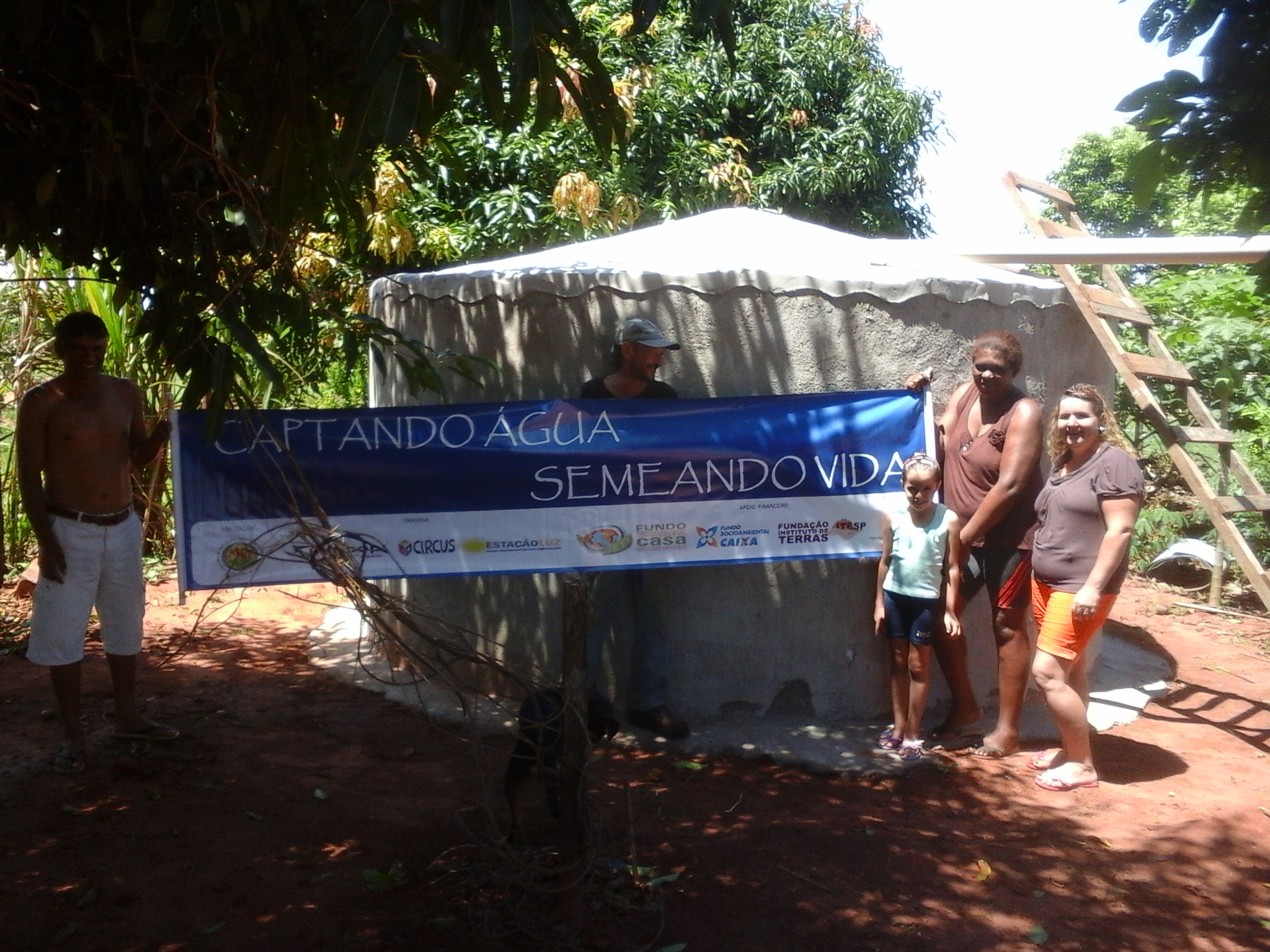
Cistern built by the project “Collecting Water, Sowing Life”, with support from the CAIXA Fund and CASA Fund. (Photo: Archive CASA Fund).
“At the meeting, we chose where to build the first water tanks. We picked the families who couldn’t plant for lack of water. There is no point in fighting for the land and end up being forced to work in the city. We have to appreciate what we’ve got. We have to be like mirrors for the others. If we are bad, we are going to reflect evil. If we are good, others will mirror us and spread goodness.”
Water uniting and feeding the collective
The work bees to build the water tanks got the community closer together, and introduced new forms of work and cooperation. In addition to the construction of water tanks, the community learned a social technology of construction that can be multiplied and generate income for families. It also improved its organization, self-esteem, and assurance. These are worthy achievements that should last forever.
This gives weight to Jean Rodrigues’ words: “We noticed the effectiveness of this initiative, the importance of our partnership, and we hope to see many of the projects supported by this call for projects on the winning list of the CAIXA Award for Best Practices. Beyond the award, we want to acknowledge and disseminate successful experiences, stimulating their replication across the country.”
We want to close the story with Dona Diva’s generous invitation, made with the wisdom of a woman who knows how to look after the land to produce food and joy. An invitation that will make your mouth water: “I just got back from the field and I’m going to make supper: soup of fresh cassava I brought from the field. Would you like some?”
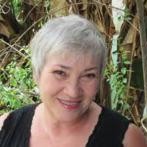 |
Text by: Angela Pappiani – Journalist, cultural producer at Ikore and CASA’s advisor since its foundation.
English translation by Jones de Freitas. |
